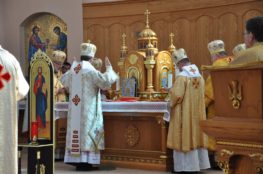I had no intention to write so much on “things Eastern” at the start of this week; it just worked out that way. What I had wanted to do was write a few words on St. Josaphat, the great Ukrainian Catholic martyr whose feast day is celebrated this week by Eastern and Western Catholics who are on the Gregorian Calendar. That may be too inflammatory at the moment. While in years past I facetiously wished my Orthodox friends and readers a “Blessed feast of St. Josaphat,” the ongoing tensions in Ukraine lead me to conclude that such well-wishing would be in bad taste. After all, none of the Orthodox sent me a special greeting on August 6, the feast day of Maxim Sandovich. (If there is an objective, non-polemical, account of this Orthodox priest’s life, I’ve never seen it.)
A commenter on Fr. John Hunwicke’s web-log, who goes by the name “Ordo Antiquus,” takes umbrage with the view that the Moscow Patriarchate (MP) of the Russian Orthodox Church is the only ecclesial body with “dirty hands” right now. Why? Because a website run by the Ukrainian Catholic University of Lviv “is relentlessly anti-Russian Orthodox and openly supports the “Kyivan Patriarchate” that no canonical Orthodox Patriarchate recognizes.” Unfortunately, this commenter cites no article—in English or Ukrainian—which contains half-truths, if not outright lies and slander, concerning the MP. If such statements are emanating from official channels of the Ukrainian Greek Catholic Church (UGCC), then they are certainly worthy of condemnation. But where are they? Certain individuals (mainly Orthodox) fail to appreciate that one of the main reasons there has been so much outrage over the anti-UGCC statements emanating from Russia is because they have come from the mouths of the MP’s highest leadership. And as for the UGCC’s friendly relations with the free (albeit non-canonical (by Orthodox lights)) Ukrainian Orthodox churches, is anyone seriously surprised by this? Besides, the UGCC is under no obligation to follow intra-Orthodox canonical feuds when determining which religious bodies it wishes to maintain fraternal ties with.
The whole situation is tragic. As troubling as some of the MP and the Russian state’s behavior has been over the past year, it’s not accidental that both have their fair share of Western sympathizers, including Catholics. The MP remains steadfastly attached to the ancient liturgical rites of the Byzantine tradition while upholding a degree of doctrinal conservatism that no doubt triggers feelings of envy among faithful Roman Catholics. With respect to the persecuted Christians of the Middle East, the MP and the Russian state have proven themselves as friends on numerous occasions—something certainly no Western power can lay consistent claim to. And beyond the borders of the MP itself lies other manifestations of the Little and Great Russian Christian traditions that are worthy of admiration. Sadly, many of the adherents to Russian Orthodoxy see so little to admire in us, Catholics of the East and West.
There’s not enough space here to unpack the reasons why. As the situation in Ukraine proves, historical tensions, if not outright conflict, between Catholics and Orthodox continue to inform present attitudes in an undeniably powerful way. The antipathy toward Catholicism, including the “Unia,” found among Orthodox living in the West is far more difficult to understand, however. It’s unfathomable to me that any Orthodox adherent who was born and raised in Western Europe, the Americas, or the Antipodes could hold any disdain for Catholicism even if they, understandably, house serious disagreements with the Church of Rome and the sui iuris churches in communion with her. This foaming at the mouth enters a frightening realm when it comes to those Eastern Catholic churches, particularly the Slavic ones which, according to a rather twisted worldview, belong by right to the Orthodox for no other reason than that they happen to use the Byzantine Rite.
While I can understand that the Orthodox would prefer that the “Unia” never happened, is it not time to come to grips with the reality that it did happen and that it will never be undone? Neither the UGCC nor any of the other Eastern Catholic churches which practice the Byzantine Rite will ever be handed over to the Orthodox, or at least I would hope not. And if some crackpot plan was put into place to do that, every one of those churches would have the right to resist. The Byzantine-Rite sui iuris churches are Catholic, and they are Orthodox; they are a bridge between East and West which have, under oftentimes deplorable conditions, started to understand what that means in a fully realized sense. Rome has not always made that self-awareness come easy, but it is emerging all the same.



